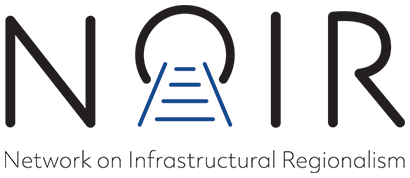Event Recap: Water Infrastructure & Regional Governance Workshop
- Jen Nelles
- Nov 13, 2020
- 7 min read

On September 29- October 2, 2020, NOIR hosted a series of virtual workshops on Water Infrastructure and Regional Governance. The workshop series, attended by participants from around the world, was designed to foster a global interdisciplinary conversation examining: (1) how water infrastructure shapes formal and informal regional spaces, communities, and governance dynamics; and (2) how these regional formations shape how water infrastructure is developed across a variety of scales and geographic contexts.
The series consisted of a keynote session followed by three moderated panels structured around specific themes. The public parts of each of these sessions were recorded and are available at the links below. A full report of the event is available here.
The event kicked off with a set of keynote addresses by Leila Harris (University of British Columbia) and Andy Karvonen (KTH Royal Institute of Technology) followed by remarks by Dan Bain (Pittsburgh Water Collaboratory) and grounded the conversation in the context of Pittsburgh and established the key questions that shaped the conversation over the following days. Prof Harris highlighted the link between inequities and infrastructure and how they can affect and reinforce one another. Harris called for researchers to think about the politics of infrastructure as they link aspects of well-being at the individual level to socio-political life. Water, Leila argued, needs to be understood beyond narrow use and exchange values. Integrating social, political, chemical, and ecological dimensions provides a necessarily more holistic approach to understanding water and infrastructure. Access to water is uneven and invokes regional inequities along race, gender, and class lines, and for indigenous communities from Mumbai to Flint, MI and Vancouver, BC. Prof Karvonen took up the theme of governance by exploring how places can build resilience through infrastructure and at what scales debate, and action, can and should occur. Karvonen argued that we need to bridge gaps between who has the money and who has the ideas. His case study region, Greater Manchester, has a pretty robust strategy to deal with local flooding from an administrative/organizational perspective, and has developed a resiliency strategy to shape actions and policy interventions on the ground: but is this enough? Here, he particularly showed how regional infrastructure gets messy ‘on the edge’. Focusing on the infrastructural challenges of the peri-urban – ‘an un(der)governed no-man’s land at risk from climate change events’ – offers the chance to learn lessons when thinking across the Global North and South. Prof Bain closed the session with an introduction to the work of the Pittsburgh Water Collaboratory to foreground the potential of cross-sectoral knowledge exchange and interrogate the portability of theory and policy packages. For Bain, the river is the infrastructure that formed the western Pennsylvania region, yet Pittsburgh is "haunted" by poor regional decision-making. Disconnects between water science and the decisions being made surrounding water governance are endemic issues in Pittsburgh and beyond. We therefore face questions regarding who keeps data surrounding regional water, and who leads the roll-out of approaches. Together, these presentations tackled some of the core themes of the event bringing out both the potential as well as key challenges to conceptualizing and governing water infrastructure at the regional scale.
The first research panel on Decision Making and Engagement in Water Governance explored how who is represented in and excluded from decision-making processes affects narratives and outcomes and how we might use that understanding to change how infrastructure is imagined, planned for, and developed. Panelists addressed these questions through the lenses of their own wide-ranging research. Fenna Hoefsloot (University of Twente) highlighted recent (and incomplete) attempts to integrate indigenous knowledge into urban water planning in Lima. Cat Button (University of Newcastle) focused on the household scale in India, exploring blind spots in how planners perceive water users and calling for a shift in thinking from the quality of water to the socially constructed qualities of water. Ramazan Sayan (UN University Institute for Water, Environment, and Health), studying interbasin governance challenges across the Sahel region, highlighted how conflicting narratives and coalitions have shaped policies in the area. Finally, Anne Taufen (University of Washington-Tacoma) drew on assemblage thinking to critically assess urban waterfront developments in Seattle and challenged the utility of political economy models as tools for understanding the complexity of regional water infrastructure systems.
Whereas regional infrastructures such as sewer lines, water treatment plants, and water transportation technologies (namely locks and dams) were constructed as part of earlier periods of urban and regional development, shifting patterns of demand threaten to diminish the utility of these assets. The second research panel on Regional Partnerships Under Threat examined how such changing dynamics are influencing (and being influenced by) the existing governance of those infrastructural networks. Sara Hughes (University of Michigan), studying the Karegnondi Water Authority in Michigan, suggested that even if state governments do not overtly create regional governments to plan and manage regions, they can influence the attentiveness of regional networks to economic development or market regionalism rather than social or redistributive regionalism. Her comments therefore importantly foregrounded the question of where (public) risk fall in conversations surrounding regional water governance, especially given the deadly consequences of these processes in Flint, MI. Dayne Walling (University of Minnesota) continued the conversation by focusing on the regional water challenges facing under-resourced cities in the Midwest and Northeast regions of the United States, while also reflecting on his time as mayor of Flint, MI. Dayne’s comments centered on the interaction of socio-spatial conditions and multi-level governance processes for planning and developing drinking water systems. Grete Gansauer (Montana State University) studying the emergence of a rural regional water authority in Montana provided a vital rejoinder to an urban-focused regional studies contending that regionalized rural infrastructures take shape in response to a different set of pressures than are experienced in urban areas, and consequently deserve more scholarly attention. Sachin Tiwale (Tata Institute of Social Sciences, Mumbai) offered a comprehensive discussion of the inequitable development of water resources in the urban agglomeration of Mumbai Metropolitan Region. His analysis captured tensions between political and hydrological-based approaches to regional water governance and the privilege position afforded to technocratic knowledge and discourse in shaping access to water at the regional scale. Karsten Zimmerman’s (TU Dortmund) comments focused on the case of the German Ruhr region, and in doing so tied together the extended urban regional frame of Mumbai and focus on deindustrialization regions. The Ruhr region offers an intriguing example for infrastructure regionalism, one in which regional water governance outpaces other metropolitan governance initiatives in a context of competitive regionalisms (i.e. statutory regional planning, economic governance, regional mobility policies).
Health crises, Federal mandates, technological innovation, and exogenous shocks can all disrupt formal and informal governance structures. In the third and final NOIR water infrastructure research panel on Emerging Complexities in Regional Water Governance, contributors explored empirical examples and theoretical advances that can help us to conceptualize how city-regions across the Global North and Global South are affected by these complexities, and to seek out best practices whereby specific regions are confronting them. Michael Finewood (Pace University) introduced collaborative research the explores municipal programs that incentivize green infrastructure installations as a tool to achieve community empowerment, but with the primary goal of contributing to broader stormwater management goals. While proponents often position community empowerment as a means for creating and sustaining effective water governance, this research calls into question what this empowerment means in practice, and considers how this process constitutes another iteration of the ongoing neoliberalization of municipal environmental governance. Richard Milligan (Georgia State University) examined regional conflicts over water use connected to surface water flows in the drainage basin of the Apalachicola-Chattahoochee-Flint (ACF) River system. The ACF is the site of one of the longest running water disputes in the United States. This research teases out a complex web of actors, decision-makers, and communities – some included in governance processes, others excluded – who variously constitute, contribute to, clamor for, and depend upon water governance in the ACF, and for whom regional governance instead of regional conflict would be much more effective. Mark Usher (University of Manchester) engaged with themes of geopolitical and transboundary conflicts and recast them through a historical analysis of Singapore’s contested emergence as a hydrosocial territory. These remarks brought together concerns surrounding geopolitics and biopolitics to examine how territory provides a linchpin between government of land and people, integrating infrastructure, legislation and government. Filippo Menga (University of Reading) rounded off the panel by offering a provocative critique of philanthropy to address global water inequities. Speaking at the intersection of political theology, political ecology and celebrity studies, he critically assessed the interrelationship between capitalism and religion in supporting the rise of technocratic, depoliticized ‘fixes’.
The RSA NOIR workshop on Water Infrastructure and Regional Governance served to advance debate and discussion at the intersection of critical water studies, the ‘global infrastructure turn’ in the social and policy sciences, and debates on the region, regionalization, and regionalism. The conversations held over the week of sessions therefore provided an opportunity to mobilize and interrogate NOIR’s research agenda for ‘regionalizing the infrastructure turn’ in concrete terms. The workshop discussions pointed to a range of important themes for future research on water infrastructure and regional studies. These include:
The importance of interrogating the knowledge, and knowledge claims emerging at the intersection of varied epistemic communities and differing scales/territories (from the household to supra-region. Here, many contributors pointed to the challenges facing inclusive and equitable decision-making presented by lived everyday practice confronting and informing knowledge as expertise. When thinking about decision-making: water governance is present both as a problem to be fixed (technocratic, political economy approaches) vs. understood (assemblage, anthropological inquiry). This compels us to interrogate the languages (or disciplinary expertise) influencing decision-making.
How regional infrastructure is rendered visible/invisible as a material element of the built environment and subject of discursive construction and political contestation. There is a need to explore the extent to which water/infrastructural knowledge is representative of the region, and the heterogeneous actors, forces, processes, and entities, within.
The significance of scale in framing and engaging complexity in an area characterized by wicked problems. Approaching questions of regional water governance at micro-, meso-, and macro scales foregrounds different actors and processes, and with this, differing ways to intervene (which in turn invoke complex and unexpected implications). Vantage point profoundly matters in this context, both relating to the importance of gender, race, ethnicity, and citizenship in shaping access to water resources, and the social, political, and geographic centrality/marginality of regional inhabitants.
Regional fragmentation was a persistent concern across the workshop sessions, with water infrastructure functioning as a contested political object, and material networks that can bring (social) space together, albeit it in uneven and ephemeral ways. Water infrastructure therefore plays a key role in shaping regional territoriality and in making political constituencies and subjectivities. It is perhaps instructive to shift from thinking about ‘whose region?’ and ‘whose resources’ to ask how to mobilize and provide water infrastructure to better care for the region.
We want to gratefully acknowledge the contributions of the event hosts and sponsors: the University of Pittsburgh’s Urban Studies Program, in collaboration with the University’s Graduate School of Public and International Affairs’ (GSPIA) Center for Metropolitan Studies, the Congress of Neighboring Communities (CONNECT), the Russian, East European, and Eurasian Studies Center, the Global Studies Center, the Pittsburgh Water Collaboratory for Water Research, Education, and Outreach; and the generous funding support from the Regional Studies Association (RSA) and Urban Geography.















Comments